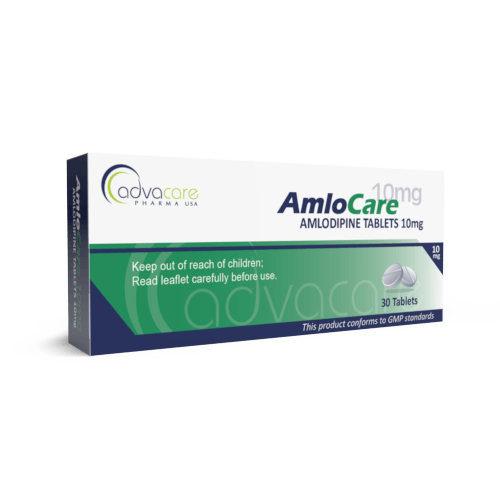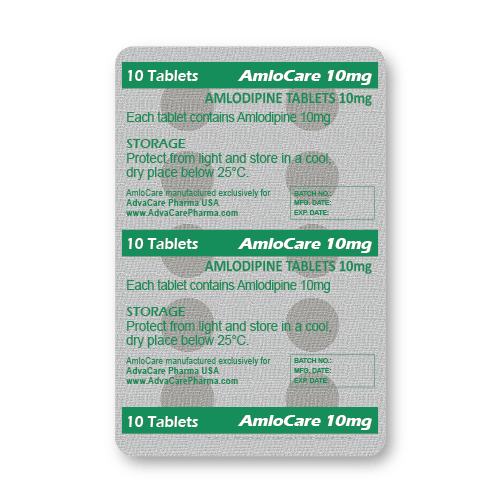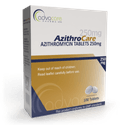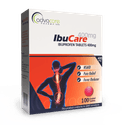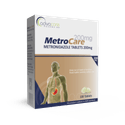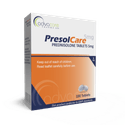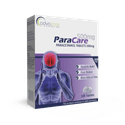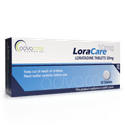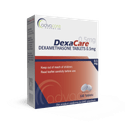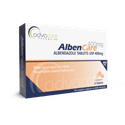- Home›
- Pharmaceuticals›
- Pharmaceutical Tablets›
- Amlodipine Tablets
Amlodipine Tablets
Dosage
Packaging
What is Amlodipine?
Active Ingredients: Amlodipine
Amlodipine Tablets are an antihypertensive drug used to treat hypertension (high blood pressure). It may be used alone or in combination with other medications. Amlodipine is also indicated for the treatment and prevention of chronic stable angina, vasospastic angina, and coronary artery disease.
Amlodipine may be prescribed to help lower the risk of complications or hospitalizations after certain heart operations, such as coronary revascularization. In cases where hypertension has not been responsive to monotherapy, a combination drug of amlodipine and atenolol may also be used.
Amlodipine was approved by the FDA in 1987 and belongs to the subgroup of calcium channel blocker (CCB) medications known as dihydropyridines. Dihydropyridines are selective for peripheral blood vessels, making them less likely to result in myocardial depression and cardiac conduction abnormalities present with other CCBs.
Amlodipine acts as a dihydropyridine calcium antagonist that inhibits the transmembrane influx of calcium ions into cardiac and vascular smooth muscle. The contraction of these muscles relies on the movement of extracellular calcium ions through ion channels. It has a greater effect on vascular smooth muscles and does not affect serum calcium concentrations. Amlodipine interacts with ion channels at a gradual rate, producing a gradual onset of effect that is long-lasting and requires less frequent dosing.
Amlodipine acts as a peripheral arterial vasodilator on vascular smooth muscle and reduces peripheral vascular resistance. Amlodipine enhances the production of nitric oxide (NO), which also acts as a vasodilator. Vasodilation relaxes the muscles of the heart and widens blood vessels. By widening and relaxing the arteries of the body, the pressure the heart must exert to pump blood around the body is significantly reduced.
The mechanisms by which amlodipine relieves angina symptoms have not been fully elucidated, but it is likely acting in the following ways: In stable (exertional) angina, amlodipine reduces the total peripheral resistance (afterload) that the heart has to work against and reduces the rate pressure product. This reduces the energy usage of myocardium and reduces the myocardial oxygen demand at any given level of exercise.
In vasospastic (Prinzmetal) angina, amlodipine blocks constriction and restores blood flow in coronary arteries and arterioles in response to calcium, potassium epinephrine, serotonin, and thromboxane A2 analog in animal models (in vivo) and human coronary vessels (in vitro). This dilation increases oxygen delivery to myocardium and reduces vasospastic angina in patients with coronary spasms.
AdvaCare Pharma is a GMP and ISO-certified manufacturer and exporter of Amlodipine Tablets. We are proud to offer a wide range of high-quality and cost-effective medical and pharmaceutical products that are available for global distribution. These medications have been manufactured in our facilities in China, India, and the USA which are compliant with international health, safety, and environmental protocols.
Why are we a leading Amlodipine manufacturer?
As a reputable Amlodipine manufacturer, we are dedicated to ensuring that GMP guidelines and standards strictly apply to the manufacture of our entire range of 200+ pharmaceutical treatments in tablet dosage form.
AdvaCare Pharma is an American pharmaceutical company committed to the manufacture of high-quality, affordable pharmaceuticals for a global market. The extensive international network that we partner with includes pharmaceutical distributors, hospitals, pharmacies, and a variety of other medical institutions. Our vision is to manufacture Amlodipine Tablets, and other quality-assured oral solid treatments, that get into the hands of those that need them most.
Uses
What is Amlodipine used for?
Amlodipine is used to treat hypertension. It is also used to treat conditions related to coronary artery disease (CAD), such as chronic stable angina and vasospastic angina (Prinzmetal's or variant angina). It can reduce the risk of hospitalization or need for coronary revascularization procedures in patients with angiographically documented CAD (without heart failure or ejection fraction < 40%). It can be used as a monotherapy or in combination with other antihypertensives and antianginals.
How should Amlodipine Tablets be used?
This medication is manufactured to be taken orally once a day. It can be taken with or without food and with most drinks.
What dose should be taken and for how long?
Adults Dosage may vary based on different medical indications:
- For the treatment of hypertension, the recommended initial dose is 5mg once daily with a maximum daily dose of 10mg. Smaller, older, or hepatically insufficient patients may be started at 2.5mg daily. Dosage is generally titrated over 7 to 14 days and adjusted according to individual need.
- For the treatment of chronic stable or vasospastic angina, the recommended initial dose is between 5 to 10mg once daily. Smaller, older, or hepatically insufficient patients may be started at 5mg daily. Most patients experience desired effects at 10mg.
- For the treatment of CAD, the recommended initial dose is between 5 to 10mg once daily. Most patients experience desired effects at 10mg.
Children (6 - 17 years) For the treatment of hypertension, the recommended dose is between 2.5 to 5mg once daily.
Refer to a doctor or pharmacist for more specific guidelines on dosage. Do not exceed what they advise.
Who can use Amlodipine?
Amlodipine can be administered to adults and children (6-17 years), but caution is advised for specific groups of patients.
Pregnant Animal studies have shown no evidence of teratogenic effects. However, they demonstrated a decrease in litter size and an increase in the number of intrauterine deaths associated with amlodipine administration. There are no adequate and well-controlled studies in pregnant people. Amlodipine should only be used during pregnancy if the potential benefit justifies any potential risk to the fetus.
Nursing It is unknown whether amlodipine is excreted in human milk, but many drugs are. In the absence of this information, either nursing or amlodipine should be discontinued, based on the importance of the drug to the patient.
Pediatric In pediatric patients < 6 years old, amlodipine’s safety and efficacy in treating hypertension have not been established. In pediatric patients ≥ 6 years old, clearance and volume of distribution values and adverse events were similar to those seen in adults.
Doses exceeding 5mg/day have not been studied in pediatric patients and should be administered with caution.
Geriatric There are insufficient studies with adults ≥ 65 years old to determine whether they respond differently than adults < 65 years old. Limited clinical data has not revealed any differences in responses between older and younger adults. Due to potential for medication sensitivity, dosing in geriatric patients should be reduced and done with caution because of age-related decreases in hepatic, renal, and/or cardiac function and concomitant disease and drug therapy. Close observation is recommended.
Can Amlodipine Tablets treatment be abruptly stopped?
Do not stop amlodipine abruptly without consulting your doctor. Sudden discontinuation may lead to a sudden increase in blood pressure.
Other warnings
In patients with renal impairment, amlodipine has not been shown altered safety and efficacy profiles and can be dosed normally.
In patients with severe hepatic impairment, caution should be exercised, and dosages may need adjustment.
There is no evidence that amlodipine affects sinoatrial nodal function or atrioventricular conduction. In studies with patients concomitantly taking beta-blockers and amlodipine alone, there were no adverse effects on electrocardiographic intervals.
In patients with severe obstructive CAD, amlodipine administration should be done with caution, as increased frequency, duration, and/or severity of angina or acute myocardial infarction upon initiating CCB therapy or increasing dosages have been reported.
In patients with severe aortic stenosis, amlodipine should be administered with caution, as rare cases of hypotension have been reported.
In patients with congestive heart failure, CCB therapy should be used with caution. Patient studies did not reveal evidence that amlodipine treatment had an adverse effect on survival or cardiac morbidity or worsened patients heart failure.
Amlodipine has not shown evidence of carcinogenic, mutagenic, or negative fertility effects in animal studies.
Postmarketing cases of jaundice and elevated liver enzymes, some of which required hospitalization, were associated with amlodipine use. There are reports of infrequent cases of gynecomastia where it is uncertain if there is a connection to amlodipine use. A possible connection between amlodipine use and extrapyramidal disorder has also been suggested.
The frequency or likelihood of a causal relationship between amlodipine use and these reactions cannot be reliably confirmed, as these cases are voluntary reports from a population of uncertain size.
Side Effects
As with all pharmaceuticals, some unwanted effects can occur from the use of Amlodipine Tablets.
Common side effects include, but are not limited to:
- headache
- swelling of the legs or ankles (peripheral edema)
- nausea
- stomach pain
- flushing
- drowsiness
- lightheadedness
- fatigue
Serious effects may include:
- severe chest pain
- rapid, irregular heartbeat
For a comprehensive understanding of all potential side effects, consult a medical professional.
If any symptoms persist or worsen, or you notice any other symptoms, please call your doctor immediately.
Precautions
Do NOT use Amlodipine Tablets if:
- You are sensitive or allergic to any of its ingredients.
- You have heart problems.
- You are pregnant or breastfeeding.
Due to possible drug interactions, consult with your doctor about any medications and supplements you are taking before initiating treatment.
Caution should be exercised regarding the consumption of grapefruit or grapefruit juice while taking amlodipine. Grapefruit can interact with amlodipine, potentially altering the effectiveness of the medication.
Limit alcohol intake, as it may enhance the blood pressure-lowering effect of amlodipine.
This medication may not be suitable for people with certain conditions, so it is important to consult with a doctor if you have any health conditions.
Amlodipine 5mg: Why the most common dose?
Amlodipine 5mg is the most common dosage as it effectively controls blood pressure with a low risk of side effects. Amlodipine 2.5mg is for patients who require less medication, while Amlodipine 10mg is used in cases of more severe hypertension.
References
A randomized, placebo-controlled trial of amlodipine in children with hypertension
This research evaluates the efficacy and safety of amlodipine in hypertensive children.
It is a randomized, double-blinded, placebo-controlled, parallel-group, dose-ranging study conducted at 49 centers in North and South America. Parameters like systolic blood pressure (BP) and diastolic blood pressure, as well as an evaluation of the function and safety of amlodipine.
This trial included 268 hypertensive children (mean age, 12.1 ± 3.3 years); 84 (31.3%) had primary hypertension, and 177 (66%) were boys. The results show that this drug has greater reductions in systolic BP than the placebo; these were −6.9 mm Hg for 2.5mg daily (P = .045 vs placebo) and −8.7 mm Hg for 5mg daily (P = .005 vs placebo). Systolic BP ≤95th percentile was achieved in 34.6% of subjects with systolic hypertension.
The conclusion of this study is that amlodipine was well tolerated, and effectively lowers systolic BP in a dose-dependent manner in hypertensive children.
You might be interested in...
Why AdvaCare Pharma?
As an industry leader, we are aware of our responsibility to provide affordable and sustainable solutions to improve healthcare worldwide.
